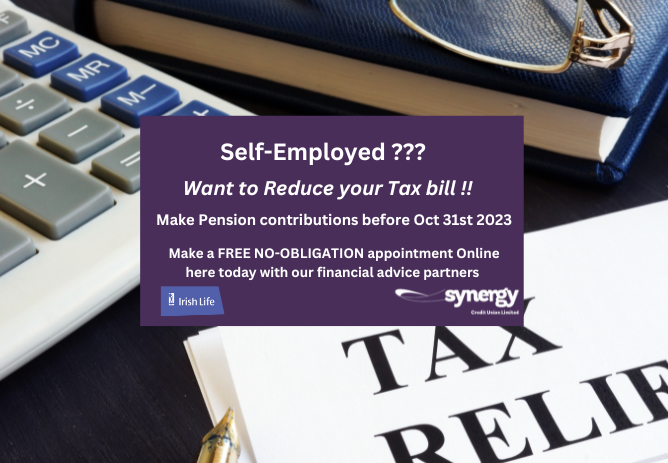07 September 2023
Self Employed? Reduce your tax bill with a pension
How a Pension can Reduce Your Income Tax Bill if You Are Self Employed
Maximise tax relief via your pension contributions!
Having a pension when you are self-employed is essential, mainly because it allows you to prepare for your retirement. But one of the other important advantages of a pension is tax relief.
Indeed, when you make pension contributions, you get self-employed tax relief on those contributions, as they are not counted as part of your income by Revenue. Therefore, not only are you investing for your future, but you are taxed at a lower rate since your taxable income is lower.
Individuals who both pay and file their tax returns through the Revenue On-line Service (ROS) have until Wednesday 15th November 2023 to pay a pension contribution and elect to backdate the
income tax relief against the 2022 tax year. Those who do not qualify for the ROS extension must do this by 31st October 2023.
How can Synergy Credit Union help you reduce your tax bill:
Synergy Credit Union has partnered with Irish Life Financial Services to offer a comprehensive financial review. Their Qualified Financial Advisers can assess your pension and retirement needs.
Financial advice brings peace of mind, allowing you to prioritise what matters most and build a better future. Start the process now before the deadline creeps up on you.
Schedule a free no-obligation appointment today: https://synergycu.ie/services/financial-planning
The three essential tax incentives that pensions offer are as follows:
- Tax relief on contributions – You can claim tax relief on contributions at your higher rate of income tax, 20% tax relief for lower earners and 40% tax relief for higher earnerson all pension contributions.
- Tax free growth – You do not pay tax on investment growth within your pension fund (No Capital Gains Tax, DIRT, or income tax).
- Tax free lump sum –At retirement, you can take a tax free lump sum up to 25% of your fund when you reach age 60 (and in certain arrangements, age 50) up to a maximum of €200,000. The balance of your fund would then need to be taken as either an Annuity or Approved Retirement Fund (ARF).
Tax relief limits:
Pensions are an extremely tax-efficient form of savings due to the tax relief you can get on your contributions and investment build-up.
Tax relief is generally subject to two main limits, which are:
- The age-related earnings percentage limit
- The total earnings limit
The age-related percentage limits are as follows:
- Under 30: 15%
- 30-39: 20%
- 40-49: 25%
- 50-54: 30%
- 55-59: 35%
- 60 or over: 40%
The amount of income tax relief you can get depends primarily on your age, and it is based on your marginal (highest) income tax rate.
A Simple example:
If you contribute €1,000 to your pension and you’re a basic rate taxpayer, you’ll receive an additional €200 in tax relief. If you’re a higher rate taxpayer, you can claim up to €400 in tax relief. The maximum amount of pension contributions that you can claim tax relief on is 25% of your income, subject to a maximum contribution of €115,000 per year.
John is 45 and earns €60,000 per year. The maximum he can contribute to his pension is 25% of €60,000, which is €15,000.
In this example, John is in the higher tax bracket, and has a marginal rate of tax at 40%.
This means he can claim 40% tax relief (€6,000) back from the state on all her contributions and will only being paying a net amount of €9,000, while realizing the total €15,000 contribution into her pension.
Backdating Pension Contributions:
You can still be eligible for a tax refund for 2022 by putting money into a pension scheme and submitting a claim to the Revenue before 31st October 2023 (later if you submit your return online).
Take advantage of backdating contributions. This is particularly relevant if you have unused pension contribution allowances or an income tax bill outstanding for the previous tax year, in which you want to reduce that tax owed to Revenue.
What do you need to do ?
A self-employed client who wants to pay a personal pension or PRSA contribution and backdate the income tax relief against their 2022 earnings needs to do the following
- Pay the contribution to the life office or PRSA provider on or before the deadline, and
- Submit their tax return to Revenue on or before the deadline. The deadline is 15th November 2023 for those who pay and file their returns using ROS.
If there is any doubt about qualifying for the ROS extension we would recommend clients pay their pension contributions and file their tax return by 31st October to ensure they meet the deadline.
When should I review my Pension?
It is important to review your pension regularly to ensure it aligns with your financial goals and retirement plan. This can involve monitoring your contributions, investment structure and performance, fees and charges, and any changes in legislation to ensure that your pension is not negatively impacted.
It’s always advisable to consult with a financial advisor who can provide up-to-date and personalized advice based on your specific situation and individual circumstances.
Why not take the opportunity to schedule a free no-obligation appointment today with our financial advice partners Irish Life Financial Services : https://synergycu.ie/services/financial-planning
Who are Irish Life Financial Services and what do they do?
Irish Life Financial Services is an insurance intermediary that can review your protection, retirement, savings and investment needs, and they offer a full financial review with one of their Qualified Financial Advisers. This can be done online or over the phone at a time and place that suits you, taking just 45-60 minutes of your time. There is no obligation to purchase and all information you provide is private and confidential.
Irish Life Financial Services is tied to Irish Life Assurance for life and pensions, so any products recommended by Irish Life Financial Services will be from Irish Life Assurance, one of Ireland’s leading life and pension providers.
Irish Life Financial Services Limited is regulated by the Central Bank of Ireland. Irish Life Assurance plc is regulated by the Central Bank of Ireland








